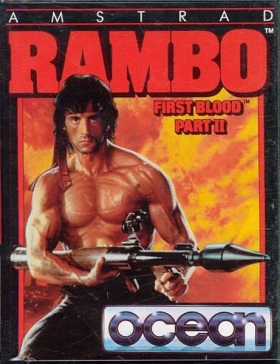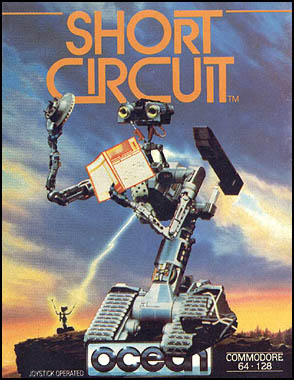When you think of video games, you tend to think of Silicon Valley whizz kids or hardcore Japanese coders sat in high tech, sleek offices. Names such as Electronic Arts, Ubisoft and Nintendo spring to mind. But do you ever think of two t-shirt salesmen in the Quaker Friends Meeting House just off Albert Square?
You may be surprised to learn that for nearly 13 years, 6 Central Street was home to Ocean Software, one of Europe’s biggest video game developers of the 80s and 90s.
Established in 1983 as Spectrum Games, Ocean was founded by David Ward and Jon Woods, who were running a clothing line for ‘the yoof’. When that folded, they moved into the games industry. Although they didn’t have a ton of experience in gaming or coding, they were eager to learn and could see the potential in game development.
In true Del Boy style, they advertised knock-off versions of arcade games in the back of gaming magazines. The games hadn’t actually been made, but they tested the market and then got a few bedroom developers to knock up the games for them.
At the time, Ocean’s biggest rivals were Imagine Software in Liverpool. Imagine were known for their flashy, high budget product packaging, fancy marketing campaigns and general party lifestyle. TT bike teams(!) and big houses don’t come cheap, and their high-rolling lifestyle was their eventual demise. As the unpaid bills piled up, the ‘rock stars of the gaming world’ were forced to sell off rights to their games and eventually went bust.
Meanwhile in Manchester, Ocean had been solidly plugging away at their business model. Instead of making knock-off arcade games, they decided to try their hand at making their own games and worked with developers to produce moderately successful titles that kept things ticking over.
However, it was when Ocean shifted their focus from the development to the publication of games in 1984 that things really took off. Much of their work was speculative and they started to acquire rights to films and shows in the making that may or may not have paid off. This speculative approach was based loosely on trend forecasting and meant that the rights were cheaper than if you were making a game after a film had been released, as the success of the film always guaranteed sales.
Their first hit was developing a game based on decathlete Daley Thompson. Thompson was a well-known athlete at the time, but Ocean took a punt on his success at the 1984 Los Angeles Olympics and developed the game before he won the Gold medal and broke the world record for the event. The game was a huge hit and one of the biggest games to ever come out on the Spectrum. Result!
This innovative approach to game design paid off and when Imagine went bust in 1984, Ocean were able to step in and buy the business and prestigious brand name, which gave them leverage in international markets. Japanese gaming giants Konami were happy to deal with the established Imagine brand and gave Ocean the rights to publish their arcade games for computers.
In 1985, Ocean secured the movie licenses for Rambo: First Blood Part II and Short Circuit. Their work was speculative and, after establishing contacts in Hollywood, they would regularly send folks out to La La land to look at scripts and pick out potentially successful films. If the film bombed, the game would bomb too, but the relative low cost of buying the rights meant it wasn’t a huge financial loss.
After the success of Rambo and Short Circuit, the 80s carried on in pretty much the same way for Ocean. They made great licensed games for films such as RoboCop, Batman and RoboCop 3. Ocean fused platform action with car driving and, when technology developed sufficiently, 3D graphics in 16-bit versions.
Ocean were also famous for the Ocean loader tunes on the Commodore 64. As the game cassettes could take up to half an hour to load up (this was the 80s after all), Ocean developed a system that displayed a picture related to the game and played chiptunes they had developed. Have a listen to these epic creations:
However, all good things must come to an end and by the mid-1990s, Ocean’s glory days were over. They had expanded into the US, but their hub failed to make an impact and was running at a loss. Buying licenses was getting more expensive as film companies were getting cannier at protecting sure-fire hits. Investing time and money into the cinematic belly flop that was Waterworld didn’t help matters either and keeping their Manchester offices meant that they weren’t as well connected with international markets (this being the era before Skype/email).
Whilst Ocean were still making money in 1996, they were barely covering their overheads, so when French gaming company Infogrames approached them, Ocean were quick to sell. The subsequent releases under the Ocean name for the N64 were fairly unremarkable, and the move to London effectively killed off any of the ‘original’ Ocean that had been left.
In 1998, Mission: Impossible was the last game to be released under the Ocean name and it’s here where the company’s story truly ends. After the release of Mission: Impossible, Ocean was renamed Infogrames UK in 1998, rebranded as Atari UK 2004 and was shut down in 2005.
Fortunately for you lot, we’re keeping the retro gaming flame alive with our interactive gaming experience, Power UP, featuring over 160 games consoles and the very best games from the past five decades, including a few classics developed by Ocean.
In order to research this blog, I watched a really good documentary on YouTube by a user called Kim Justice. If you want to know more about Ocean, the documentary is well worth a watch. It’s got a few swears in it but the narration made me laugh; she sounds a bit like Chris Packham and she knows her (gaming) onions:
Power UP returns to Manchester from 18 June 2022 and will be open during weekends and school holidays. Find out more and book tickets now.


